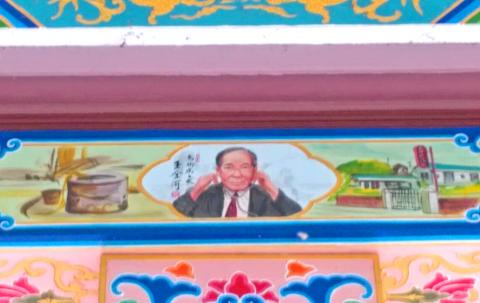In a departure from traditional religious themes, new murals at Tainan’s Nankunshen Daitian Temple (南鯤鯓代天府) feature departed and contemporary Taiwanese celebrities to commemorate their contributions to society.
While most temple murals are inspired by mythological or historical figures, Nankunshen Daitian — built in 1817 and widely hailed as the founding temple for Wang Ye worship in Taiwan — took a different tack, using images of Taiwanese celebrities and landscapes, temple board director Hou Hsien-hsun (侯賢遜) said on Sunday.
A collection of freshly painted murals line a hallway from the main worship hall to an auxiliary shrine, featuring individuals that include Lin Chieh-liang (林杰樑), who gained a reputation as a guardian of public health after giving valuable food safety advice amid a number of food scares in recent years, and the late Wang King-ho (王金河), a doctor popularly known as the “Father of Blackfoot Disease” for his work combating the disease.

Photo: Yang Chin-cheng, Taipei Times
Others depicted in the murals include 1968 Mexico City Olympics women’s 80m hurdles bronze medalist Chi Cheng (紀政), Nobel laureate Lee Yuan-tseh (李遠哲) and renowned painter and 228 Massacre victim Chen Cheng-po (陳澄波).
Hou said the murals, part of a recent renovation project, are the latest additions to a collection started two years ago that adorns the walls and pillars of the main worship hall with portraits of athletes such as NBA player Jeremy Lin (林書豪), former world No. 1 golfer Yani Tseng (曾雅妮) and major league pitchers Chen Wei-yin (陳偉殷) and Wang Chien-ming (王建民), as well as philanthropist Chen Shu-chu (陳樹菊) and the late painter Hung Tung (洪通).
Taiwanese landscapes are another prominent motif of the murals, including an ancient salt field and a newly constructed crystal church in Tainan’s Beimen District (北門), Hou added.
Visitor Yang Jui-che (楊睿哲) said that looking at the temple’s murals was like reading a Taiwanese history book, adding that photographs of the murals had gone viral among the nation’s netizens.

Chinese Nationalist Party (KMT) Chairman Eric Chu (朱立倫), spokeswoman Yang Chih-yu (楊智伃) and Legislator Hsieh Lung-chieh (謝龍介) would be summoned by police for questioning for leading an illegal assembly on Thursday evening last week, Minister of the Interior Liu Shyh-fang (劉世芳) said today. The three KMT officials led an assembly outside the Taipei City Prosecutors’ Office, a restricted area where public assembly is not allowed, protesting the questioning of several KMT staff and searches of KMT headquarters and offices in a recall petition forgery case. Chu, Yang and Hsieh are all suspected of contravening the Assembly and Parade Act (集會遊行法) by holding

PRAISE: Japanese visitor Takashi Kubota said the Taiwanese temple architecture images showcased in the AI Art Gallery were the most impressive displays he saw Taiwan does not have an official pavilion at the World Expo in Osaka, Japan, because of its diplomatic predicament, but the government-backed Tech World pavilion is drawing interest with its unique recreations of works by Taiwanese artists. The pavilion features an artificial intelligence (AI)-based art gallery showcasing works of famous Taiwanese artists from the Japanese colonial period using innovative technologies. Among its main simulated displays are Eastern gouache paintings by Chen Chin (陳進), Lin Yu-shan (林玉山) and Kuo Hsueh-hu (郭雪湖), who were the three young Taiwanese painters selected for the East Asian Painting exhibition in 1927. Gouache is a water-based

Taiwan would welcome the return of Honduras as a diplomatic ally if its next president decides to make such a move, Minister of Foreign Affairs Lin Chia-lung (林佳龍) said yesterday. “Of course, we would welcome Honduras if they want to restore diplomatic ties with Taiwan after their elections,” Lin said at a meeting of the legislature’s Foreign Affairs and National Defense Committee, when asked to comment on statements made by two of the three Honduran presidential candidates during the presidential campaign in the Central American country. Taiwan is paying close attention to the region as a whole in the wake of a

OFF-TARGET: More than 30,000 participants were expected to take part in the Games next month, but only 6,550 foreign and 19,400 Taiwanese athletes have registered Taipei city councilors yesterday blasted the organizers of next month’s World Masters Games over sudden timetable and venue changes, which they said have caused thousands of participants to back out of the international sporting event, among other organizational issues. They also cited visa delays and political interference by China as reasons many foreign athletes are requesting refunds for the event, to be held from May 17 to 30. Jointly organized by the Taipei and New Taipei City governments, the games have been rocked by numerous controversies since preparations began in 2020. Taipei City Councilor Lin Yen-feng (林延鳳) said yesterday that new measures by